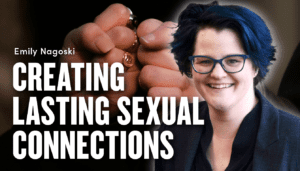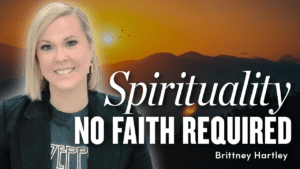- Do you miss the “spirituality” that you once felt as an active Mormon?
- Have you struggled to find joy/meaning/mental health after losing your Mormon faith?
- Are you still active in the LDS Church, but feeling spiritually empty as of late?
Join me as I assemble am amazing panel of wise humans to discuss “Spirituality After Mormonism.” Panelists include Margi Weber Dehlin, Anthony D. Miller, Samantha Shelley (Zelph On The Shelf), and Holly Ashton Wallin. You will not be disappointed with this amazing lineup of wise humans.
Show Notes:
Anthony’s lists:
- Books:
- A New Earth, Eckhart Tolle
- The Power of Myth, Joseph Campbell / Bill Moyers
- Braving the Wilderness, Brene Brown
- Lost Connections, Johann Hari
- Untamed, Glennon Doyle
- Everything is Spiritual, Rob Bell
- Love Wins, Rob Bell
- The Untethered Soul, Michael A. Singer
- Searching for Sunday, Rachel Held Evans
- Secular Buddhism, Noah Rasheta
- Finding God in the Waves, Mike McHargue
- This: Becoming Free, Michael Gungor
- The Heart of Christianity, Marcus Borg
- Falling Upward, Richard Rohr
- Universal Christ, Richard Rohr
- Spiritual Athiest, Nick Senaca Jankel
- Bathing With God, Glenn Ostlund
- Waking Up: A Guide to Spirituality Without Religion, Sam Harris
- Podcasts:
- A Thoughtful Faith, Gina Colvin
- Almost Awakened, Bill Reel
- Another Name for Everything, Richard Rohr
- Bathing with God, Glenn Ostlund
- Exmormonology, Amy Logan
- Making Sense, Sam Harris
- Mormon Sabbatical, Mette Ivie Harrison
- On Being with Krista Tippett
- Oprah’s Super Soul Conversations
- Secular Buddhism, Noah Rasheta
- The Liturgists Podcast
- The RobCast, Rob Bell
- Unlocking Us, Brene Brown
- Other:
Samantha’s Lists
- Books:
- A New Earth by Eckhart Tolle https://amzn.to/2OidTMZ
- The Untethered Soul by Michael A. Singer https://amzn.to/3sE6dDm
- Inner Bonding by Margaret Paul https://amzn.to/3bUcowp
- Conscious Loving by Gay and Kathlyn Hendricks https://amzn.to/2NOIX7e
- True Refuge by Tara Brach https://amzn.to/3sG151N
- Podcast:
- 10% Happier
- Meditation App:
- Headspace
Holly’s Lists:
- Books:
- A New Earth
- Mans Search for Meaning
- The Four Agreements
- Universal Christ
- Seat of the Soul
- The 8 Human Talents
- Breath
- UnTamed
- Tiny Beautiful Things
- The Awakened Family
- Big Magic
- Real Love
- Poetry:
- Drew Lanham
- Mary Oliver
- Rumi
- Podcasts:
- On BEING
- Oprah’s Super Soul Sunday
- Gift of the Mormon Faith Crisis
- Mormon Stories Podcast
- Secular Buddhism
- Another Name for Everything
- The Resilience Breakthrough
- UnLocking Us
- Tara Brach
- The Meditative Story
Margi’s Lists:
- Books
- A New Earth
- Untamed
- Tiny Beautiful Things
- The Course of Love
- The Awakened Family
- Getting the Love You Want
- Broken Open
- Adult Children of Emotionally Immature Parents
- Magical Journey
- Poetry
- Mary Oliver
- David Whyte
- Andrea Gibson
- Podcasts
- The Meditative Story
- A New Earth with Oprah
- The Living Experiment
- 10% Happier Podcast




4 Responses
For anyone who hasn’t seen my recent comments in the comment sections of the John Hamer (https://www.mormonstories.org/podcast/undefining-god-with-john-hamer/) and Jana Spangler ( https://www.mormonstories.org/podcast/contemplative-mormonism-jana-spangler/ ) podcasts, I am a mainstream Christian.
It was a combination of multiple visits by Latter-day Saint Missionaries and grief that initially got me interested in watching the Mormon Stories Podcasts. The feelings experienced by post Mormons was, in some respects, similar to the feelings of grief I experienced after my wife died. Pain and deep sadness were emotions we all had in common. I had a lot of empathy for those who were sharing their stories. It has been over four years since the loss of my wife and I am fortunate that I had a lot of support and love during the grief process. My healing was much quicker than what I was hearing from many post Mormons during podcast interviews .
When I started watching the Finding Spirituality after Mormonism episode, I thought it would be all about spirituality. What I was surprised to find was a significant portion of the discussion was about grief. Since grief is usually associated with loss, I started to listen to what the panel members were saying is lost during the Mormon faith transition process.
John Dehlin made an interesting statement that included many of the things that are lost. He said the following: ” I think one of the things that doesn’t quite get captured is just how brutal leaving a high demand religion is . . . and to some extent, the fact that any of us are still alive and healthy and functioning on a basic level is really a remarkable statement . . . because you lose identity, family, community, sense of self, spirituality, resolutions about the afterlife. It is, it can be overwhelming and people can get lost and so I think we’re almost forced to strengthen ourselves spiritually just to survive.
In addition to identity, family, community, sense of self, spirituality, and resolutions about the afterlife that John spoke about, Holly added that she lost a sense of purpose, a script, a plan, a roadmap, a literal belief, certainty of belief, parenting guidelines and the sense of identity John mentioned. Anthony added That there is often no support and not knowing what to do as part of what many experience. Margi was particularly troubled by the afterlife situation John spoke about at the time of the loss of her father.
These are some of the things lost during a Mormon faith transition that I noted during the podcast. There are probably others that I missed and I’m sure other people could add significantly to the list. While the list is not all encompassing, I think it is fairly comprehensive. Sam also noted that: “The Church moralizes happiness so much and so being really depressed after leaving it is, to a lot of people, seen as proof that you followed Satan, did the wrong thing.” While I don’t think of depression and being labeled as a follower of Satan as a loss, it is a traumatic part of the loss process.
Feelings that were expressed related to the Mormon transition process were feelings of betrayal, anger, sadness, fear and pain. Dark night of the soul was the term used to describe the most difficult times of the process. Anthony added that there are things that compound the grief process for those transitioning out of Mormonism. He said the following: “In Mormonism the narrative is commonly if you experience grief it’s because of a deficiency of faith . . . or, if you experience grief it is because of a deficiency of worthiness . . . and those are extremely harmful.”
Given the complexity of the Mormon faith transition process and the amount of loss, is it any wonder so many people have so much difficulty with the process? I think John’s assessment that it is a brutal process is a good summation of how difficult the process can be. In spite of the brutality of the process, most of the panel members seemed to be in a better place at this time in their lives. The one person who still seemed to be experiencing significant difficulty was Holly. Her wounds still seemed to be raw and extremely painful. Given the significant degree of loss that she has experienced, I don’t think I would be doing nearly as well as she has done if I had experienced the same degree of loss she has experienced. Fortunately, she has found support through the love of good friends like Margi and John.
While I don’t want to trivialize the loss of a close loved one, like a spouse or a parent, I do think the process of transitioning out of Mormonism can be even more difficult. The difficulty of the combination of a faith crisis and the death of a loved one Margi experienced along with the strained marital relationship and excommunication (of John) that Margi and John experienced together is hard to imagine. The divorce and other situations Holly experienced in combination with her faith transition process must be unimaginably difficult.
As part of the panel discussion, John asked for top resources, podcasts, books, etc. that are important sources of spirituality. Most of the responses to that question involved secular resources and practices like yoga. I didn’t hear much about what I found to be my greatest source of strength during my time of significant grief. You might have already guessed that my source of strength was confidence in the promises of Jesus. Knowing I would see my wife again and spend eternity with her was extremely comforting. My confidence that will happen isn’t based on anything I have done. It is based solely on what Jesus has done for me.
After communicating with many former Mormons, I understand the reluctance to jump back into what I think most former Mormons would consider religion. I actually agree with a reluctance to jump back into religion. What I am suggesting instead is establishing a relationship instead of a religion. A relationship with Jesus.
I would probably have a strong aversion to any suggestion of religion myself if I had experienced what many have described as betrayal by what John called “high demand religion”. Based on what many have said during the podcasts, I think my personal response, if I had been an active member of the Latter-day Saint Church for a prolonged period of time, would have been extreme anger and bitterness. For that reason I could understand if someone expressed anger at a comment like this that is suggesting what, for many, is a religious suggestion. On the other hand, I think it would be unkind to not at least offer a suggestion of something that has brought me so much comfort and peace during a significant period of grief in my life.
While the prior podcast posts I mentioned and linked at the beginning of this comment were critical of the things the Latter-day Saint Church teaches about God and Jesus, I do think most former Latter-day Saints were exposed to the loving and compassionate side of Jesus through what they learned from the Bible. I think that is part of the reason why so many former Latter-day Saints are still so loving and compassionate and have a strong desire to help other people. I think they are reflecting part of the nature of Jesus they learned about from the Bible.
In my opinion, establishing a relationship with the true Jesus of the Bible is the one thing that can restore so much of what is/was lost during a Mormon faith crisis. In addition, it is something that can restore transcendent meaning, purpose and value to life. It will also provide strength in the present and hope for the future to those who accept Jesus as their Lord and savior.
Of course, you will have to decide for yourself if the Bible is true and if the God and Jesus revealed in the Bible really exist. That is why I encouraged people to investigate things for themselves in the prior podcast comments I linked at the beginning of this comment. At the very least, I think a serious investigation of the evidence for the resurrection of Jesus would be very helpful. I think every post Mormon should fully explore and investigate that subject for themselves.
Thanks to John, Margi, Holly, Sam and Anthony for exposing the brutality of the Mormon faith transition process. I am sorry all of you had/have to experience the effects of that process. Whatever you decide, I wish you all the best as you continue your journey through life.
This episode has been so helpful. Yes, please have a spin off and do a podcast on spirituality!
Thank you
Thank you so much for this podcast! I have been out of Mormonism a few years now and this really helped me process my own journey with spirituality. There is some really healthy stuff here. Thank you to all of the panelists.
Margi,
I watched this episode and love all the contributions of the panel but really resonated with your strength of coming into your “being” and not just hustling and doing.
I’m sure I have enough credit hours in hustling for my self-worth as a Mormon for 37 years, that I could have earned a Master’s Degree . . . but none of that endless hustling every made me feel any better about who I was, because all the information about who I was, who I was supposed to be, how I was supposed to be in the world, and exactly what my life should look like, came from the Church, not from inside myself. I left in 2015, grieved and deconstructed for four+ years, and at the 5-year point came to actually – FINALLY – know my own mind, trust my own gut and found myself following my own heart and loving my life! For so many years prior, I had been stuffing down my own desires and interests (going along to get along) just to fit in and feel acceptable to my husband (whom I divorced in 2015 after 33 years) to the other members of the Church and to God. I found myself 140 pounds overweight, addicted to binge eating and stuffing my rage down. We are so blessed to be out from under the smothering confinement of the tiny box that is Mormonism (and the tinier box inside, where women in the Church are allowed to be.) Life is the BEST its ever been! I finally know peace, joy and contentment – and I accept and love myself – which is HUGE! I’ve learned to BE, to sit still with my feelings and know they won’t suffocate me. It has taken me over three years, but I have slowly and lovingly lost over 100 pounds. Margi, thank you for all you do and have sacrificed to live your truth and support your hubby and Mormon Stories! This podcast has been a lifeline for many of us who didn’t know where to turn with the truth when we found it or how to make sense of all the rage and grief. Thank you for your example of BEING.
Sandy Phillips – Vancouver WA